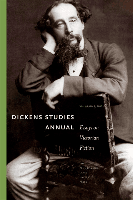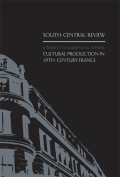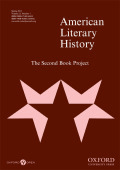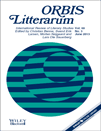
Estudios de Teoria Literaria-Revista Digital-Artes Letras Humanidades
Scope & Guideline
Unveiling Complex Theoretical Frameworks
Introduction
Aims and Scopes
- Literary Theory and Criticism:
The journal emphasizes the examination of literary theories and methodologies, encouraging authors to engage with both classical and contemporary frameworks to analyze texts from diverse perspectives. - Cultural Intersections:
A significant focus is placed on the interplay between literature and other cultural forms, including visual arts, cinema, and digital media, highlighting how these interactions shape narratives and critical discourse. - Latin American Literature:
The journal showcases a commitment to Latin American authors and literary traditions, exploring themes of identity, migration, and socio-political contexts, thus contributing to the broader discourse on regional literatures. - Gender Studies and Feminist Criticism:
There is a consistent focus on feminist perspectives within literary studies, examining how gender influences literary production and reception, and advocating for the representation of marginalized voices in literature. - Digital Humanities:
The journal includes discussions on digital literature and the impact of technology on literary practices, exploring how digital tools can reshape the creation, dissemination, and critique of literary works. - Ecocriticism and Environmental Literature:
Recent issues have begun to incorporate ecocritical approaches, analyzing the representation of nature and environmental concerns in literature, reflecting a growing awareness of ecological issues in literary studies.
Trending and Emerging
- Posthumanism and New Materialism:
There is a rising interest in posthumanist theories that challenge anthropocentric narratives, exploring how literature engages with non-human perspectives and the materiality of texts. - Digital Narratives and Cyberculture:
The exploration of digital narratives and their implications for literary forms is becoming increasingly prominent, reflecting the impact of technology on storytelling and reader engagement. - Interdisciplinary Approaches:
Scholarly work that crosses disciplinary boundaries—integrating insights from sociology, philosophy, and cultural studies—has gained traction, enriching literary analysis with diverse perspectives. - Memory Studies:
A growing emphasis on memory, trauma, and historical narratives indicates a trend towards examining how literature negotiates collective memory and the impact of historical events on identity. - Globalization and Transnationalism:
Papers addressing the effects of globalization on literature, particularly in terms of migration and cultural exchange, are becoming more common, reflecting the interconnectedness of contemporary literary landscapes.
Declining or Waning
- Traditional Narratology:
There has been a noticeable decline in papers strictly adhering to traditional narratological frameworks, as scholars increasingly favor interdisciplinary approaches that incorporate poststructuralist and posthumanist theories. - Historical Literary Studies:
The focus on historical literary analysis, particularly concerning canonical texts from previous centuries, seems to be diminishing. This may be due to a growing interest in contemporary and emerging literatures that address current social issues. - Textual Formalism:
Formalistic analyses that prioritize text structure and aesthetic qualities over socio-political contexts are less frequently featured, indicating a shift towards more contextually grounded literary criticism. - Eurocentric Literary Canon:
Papers centered around the Eurocentric literary canon are becoming less prevalent, as the journal increasingly prioritizes voices and narratives from Latin America and other underrepresented regions. - Censorship Studies:
Although censorship has been a topic of interest, it appears to be less frequently addressed in recent issues, possibly due to the journal's focus shifting towards broader themes of representation and identity.
Similar Journals

CRITICA LETTERARIA
Navigating the Complexities of Literature and TheoryCRITICA LETTERARIA is an esteemed literary journal published by Paolo Loffredo Iniziative Editoriali SRL that has been contributing to discussions in the field of literature and literary theory since its inception in 2009. With an ISSN of 0390-0142 and an E-ISSN of 2035-2638, this journal is indexed in Scopus, ranking in the category of Arts and Humanities under Literature and Literary Theory. It is classified in the Q4 quartile, indicating its dedication to serving a niche yet vital discourse within the broader literary community. Although currently not open access, the journal offers a platform for scholars, researchers, and students to engage with diverse literary analyses and theoretical advancements. Located in the vibrant city of Naples, Italy, CRITICA LETTERARIA aims to foster academic dialogue and promote innovative approaches in literary studies, making it an important resource for anyone passionate about navigating the complexities of literary narratives and theory.

Cuadernos Lirico
Empowering Voices in the World of LiteratureCuadernos Lirico is a prestigious academic journal dedicated to the exploration of literature and literary theory, published by CUADERNOS LIRICO. With an ISSN of 2263-2158 and E-ISSN 2262-8339, this journal has been committed to open access since 2011, ensuring wide dissemination of its research across the globe. Based in France, the journal serves as a vital platform for scholars and practitioners, promoting innovative discourse within its field. Despite its current position in Q4 of the Literature and Literary Theory category and a Scopus rank of #993/1106, Cuadernos Lirico aims to bolster its impact through the publication of high-quality, peer-reviewed articles that contribute to the understanding and analysis of literary texts and theories. The journal invites contributions that engage with diverse perspectives and methodologies, fostering a rich dialogue among researchers, literary critics, and educators. Join us in advancing the scholarly pursuit of literature by contributing to this dynamic platform.

Revista de Letras
Advancing Critical Thought in Brazilian AcademiaRevista de Letras is an esteemed academic journal published by Universidade Estadual Paulista (UNESP), dedicated to the fields of Literature and Literary Theory, as well as Philosophy. With its ISSN 0101-3505 and E-ISSN 1981-7886, the journal serves as a significant platform for the dissemination of scholarly research and critical thought, particularly within the Brazilian context and beyond. Operating from Araraquara, SP, Brazil, the journal spans the period from 2004 to 2023, featuring a diverse array of articles aiming to explore various literary and philosophical discourses. Despite its current Q4 ranking in both the Literature and Literary Theory and Philosophy categories, the journal continues to foster a vibrant academic community, promoting rigorous scholarship and intellectual engagement. Researchers, professionals, and students alike are invited to contribute to and engage with the evolving narratives presented in this publication, aiming to enhance understanding and facilitate discussions within these crucial fields.

Dickens Studies Annual
Advancing Scholarship on Dickens and SocietyDickens Studies Annual, published by Penn State University Press, is a distinguished journal devoted to the scholarly examination of Charles Dickens and his literary contributions. With an ISSN of 0084-9812 and an E-ISSN of 2167-8510, this publication provides a vital platform for researchers, students, and professionals in the field of Victorian literature and cultural studies. The journal aims to explore the complexities of Dickens's works, encompassing critical analysis, historical context, and interdisciplinary approaches, thus positioning itself as a critical resource for understanding the broader impact of Dickens's writing on literature and society. Although not currently adopting an open access model, readers can access a wealth of rigorously researched articles that contribute significantly to ongoing dialogues within Dickens studies. The journal's focus on innovation and excellence ensures that it remains an essential reference for those seeking to deepen their understanding of one of literature's most influential figures.

South Central Review
Exploring the Rich Tapestry of Southern CultureSouth Central Review, a distinguished academic journal published by Johns Hopkins University Press, serves as a vital platform for scholarly discourse in the fields of cultural studies, literature and literary theory, philosophy, and the visual and performing arts. With an ISSN of 0743-6831 and an E-ISSN of 1549-3377, this journal is dedicated to highlighting innovative research and critical analyses that explore the complexities of Southern culture and its broader implications. Although it operates without an open access option, the journal is recognized for its rigorous peer-review process and contributions to contemporary academic dialogue, holding Q3 and Q4 rankings across several disciplines as of 2023. The convergence of ideas and perspectives from diverse academic backgrounds positions the South Central Review as an essential resource for researchers, professionals, and students seeking to deepen their understanding of the cultural narratives shaping our world today.

Slovenska Literatura
Advancing Global Conversations in Slovak LiteratureSlovenska Literatura, published by the prestigious SLOVAK ACADEMY OF SCIENCES, INSTITUTE OF SLOVAK LITERATURE, stands as a vital resource in the field of literature and literary theory. With an ISSN of 0037-6973, this journal has attained an impressive Q1 category status in its discipline as of 2023, placing it among the elite literary journals globally. Open access since 2017, Slovenska Literatura provides an inclusive platform for the dissemination of innovative research and critical discussions while fostering scholarly communication across borders. The journal aims to explore the rich tapestry of Slovak literature as well as its interaction with global literary trends, offering insights that are integral for researchers, professionals, and students alike. With its publication base located in Bratislava, Slovakia, it has established itself as an essential point of reference for anyone interested in the complexities of literature, earning its recognition within the Scopus Arts and Humanities ranking. Researchers can delve into its contributions, significantly enriching their understanding of both local and international literary landscapes.

AMERICAN LITERARY HISTORY
Connecting Literature to Cultural and Historical NarrativesAMERICAN LITERARY HISTORY, published by Oxford University Press Inc, is a leading peer-reviewed journal dedicated to advancing the understanding of American literature within the broader contexts of cultural studies and history. With an impressive impact factor reflecting its Q1 ranking in Cultural Studies, History, and Literature and Literary Theory, this journal serves as an essential resource for researchers, professionals, and students alike. Covering a wide range of topics, it seeks to illuminate the historical and cultural dynamics that shape literary production in the United States from 1989 to 2024. Although not an open access journal, AMERICAN LITERARY HISTORY remains a pivotal platform for scholarly discourse, encouraging rigorous scholarship and critical engagement with literary texts. The journal's strong Scopus rankings further emphasize its significance, ranked among the top journals in its field, making it an indispensable tool for anyone seeking to explore the rich tapestry of American literary heritage.

Enthymema-International Journal of Literary Criticism Literary Theory and Philosophy of Literature
Unveiling New Horizons in Literary PhilosophyEnthymema - International Journal of Literary Criticism, Literary Theory and Philosophy of Literature, published by Milano University Press, is a leading open-access platform dedicated to the dynamic fields of literary criticism and theory as well as the philosophy surrounding literature. With an ISSN of 2037-2426, this esteemed journal has been fostering scholarly dialogue and innovative discourse since its inception in 2009. As a member of the prestigious Q2 quartile in the Literature and Literary Theory category as of 2023, Enthymema ranks favorably within the Scopus framework, currently positioned at #599 out of 1106 journals, reflecting a robust engagement with current academic trends. The journal emphasizes inclusivity and accessibility, ensuring that cutting-edge research and critical insights are available to a wider audience without financial barriers. With its significant focus on contemporary debates and theoretical advancements, Enthymema serves as an essential resource for researchers, professionals, and students eager to navigate the intricate landscapes of literary studies.

Olho d Agua
Connecting Scholars to Transform Water ManagementOlho d Agua is a distinguished academic journal published by the UNIV ESTADUAL PAULISTA and FUNDACAO EDITORA UNESP, focusing on a diverse range of topics relevant to environmental sciences, water resource management, and sustainability. With its commitment to Open Access publishing since 2009, it aims to democratize knowledge and encourage the dissemination of high-quality research without financial barriers. This platform not only fosters scholarly communication but also serves as a vital resource for researchers, professionals, and students engaged in addressing contemporary water issues in Brazil and beyond. Although the journal's impact factor and H-index are currently unlisted, its ongoing contributions position it as a burgeoning reference in the field, encouraging innovative ideas and solutions to pressing ecological challenges.

ORBIS LITTERARUM
Advancing Scholarly Insights in Literary TheoryORBIS LITTERARUM, published by Wiley, is a prestigious journal in the field of Literature and Literary Theory, aiming to foster in-depth scholarly discussions and critical analyses of literary works and their theoretical underpinnings. With its ISSN 0105-7510 and E-ISSN 1600-0730, the journal presents a rich legacy that spans several decades, having converged its publishing efforts from 1943 to 1950 and from 1954 to the present day, thus ensuring a continuity of discourse in the literary field. Recognized for its high quality, ORBIS LITTERARUM is ranked in the Q2 quartile of literature disciplines as per the 2023 metrics, placing it within the top 26% of its category and earning a favorable position in the Scopus Rankings with a percentile of 74 in the arts and humanities. Researchers, professionals, and students alike are encouraged to contribute to this esteemed journal to engage with contemporary literary debates and to influence future scholarship in literature, enhancing understanding of texts across cultures and epochs.